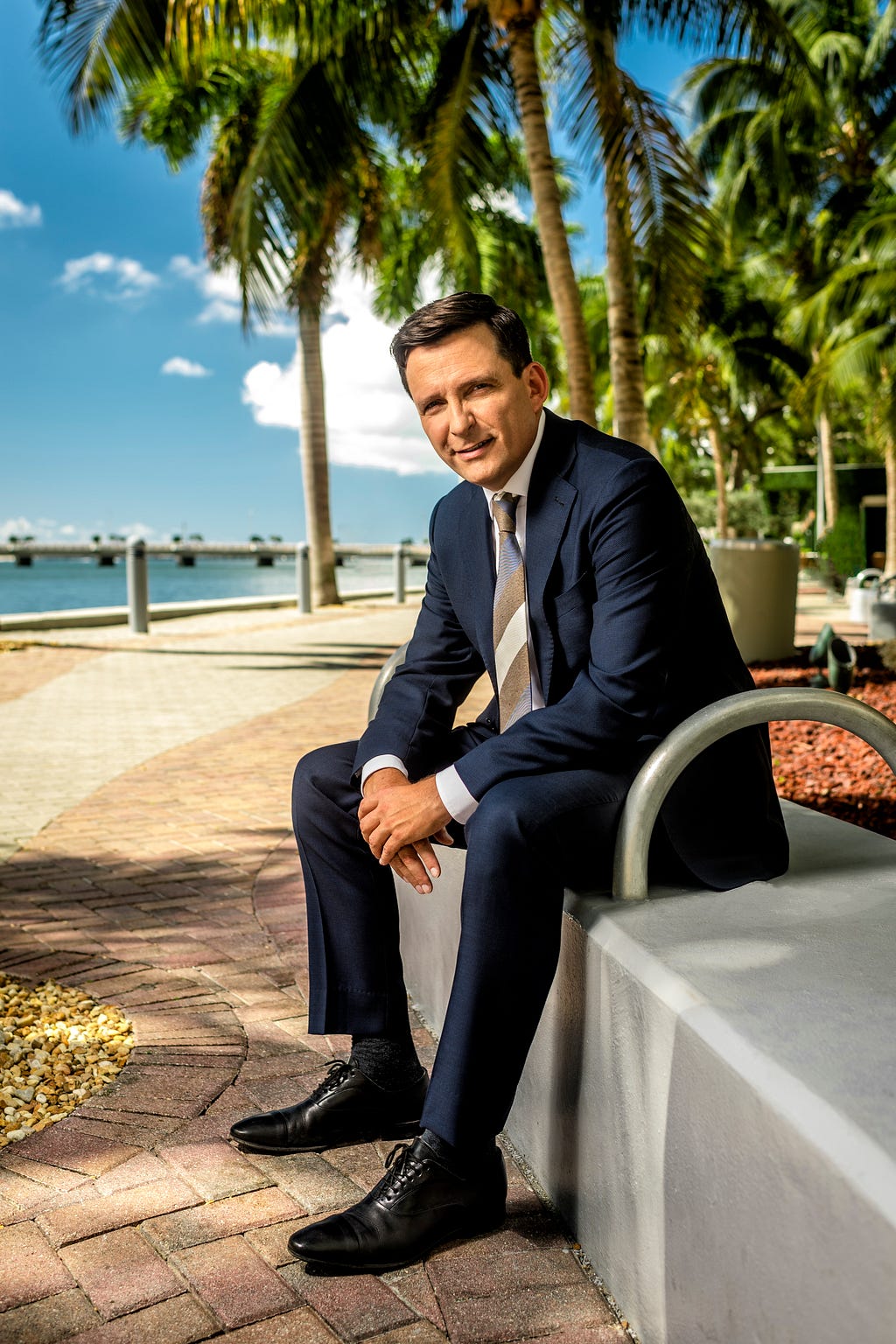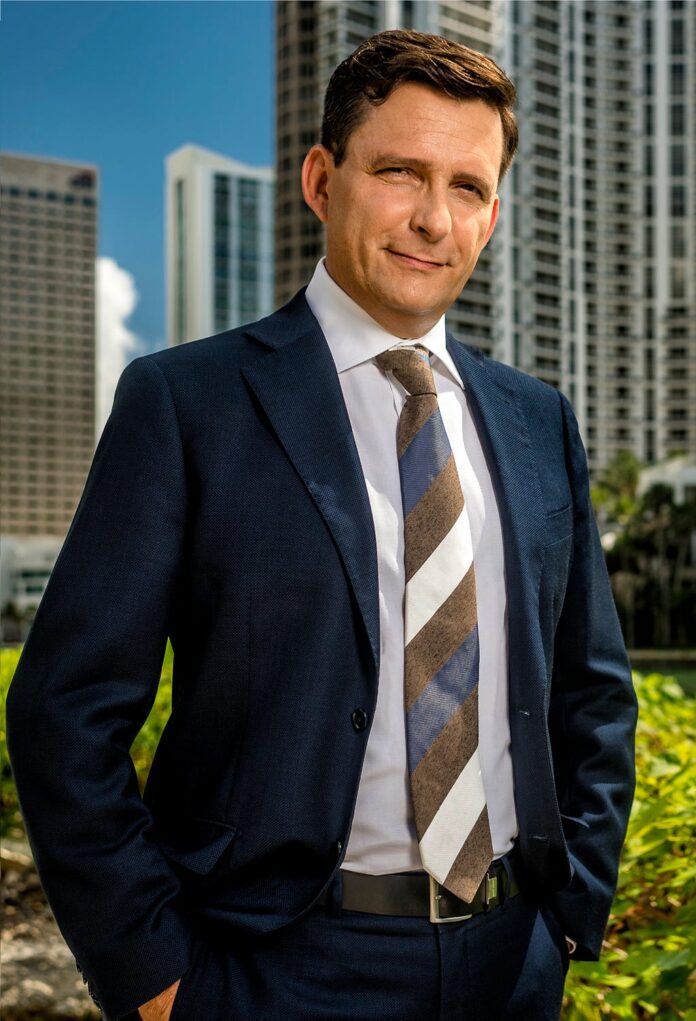Quiet Committing: Marco Scanu Of Visa Business Plans On The Five Commitments High Impact Leaders Make & Keep To Themselves Daily
An interview with Karen Mangia
1 . Exemplifying the authentic engagement that I wish to see from my team.
2 . Cultivating reliability as a matter of self-discipline.
3 . Seeking to understand before being understood.
4 . Fostering a company culture that promotes self-determination, bravery, and cooperation.
5 . Coaching and delegating in a way that creates productivity for the present and personal growth for the future.
Quiet quitting is the emerging phenomenon of employee disengagement, essentially quitting on the job. What strategies do high-impact leaders deploy to motivate themselves and those around them to move from quiet quitting to quiet committing? Because, at its core, there is no change without commitment. Commitment to change ideas. Change beliefs. Change perspectives. Change routines, rituals and boundaries. Organizations change one commitment at a time. One leader at a time. As part of our series about “Quiet Committing: The Top Five Commitments High Impact Leaders Make & Keep To Themselves Daily,” we had the pleasure of interviewing Marco Scanu.
Founder & CEO of Visa Business Plans Marco Scanu is a certified coach from the University of Miami with a globally-based practice coaching Fortune 1000 company executives, entrepreneurs, and professionals in four different continents. Mr. Scanu advises clients on turnaround strategies and crisis management. Mr. Scanu received a bachelor’s degree in Business Administration from the University of Florida and an MBA in Management from Bocconi University in Milan, Italy. Mr. Scanu was also a Visiting Scholar at Michigan State University under the prestigious H. Humphrey Fellowship with a focus on entrepreneurship, venture capital, and high-growth enterprises.
Thank you for making time for our visit. What was the first job you had, and how did that job shape the leader you are today?
My first job was cleaning the kitchen at home, and I consider it as such because it wasn’t the typical childhood chore list. My mother was a doctor and enforced a high level of hygiene and disciplinary excellence. My cleaning was rigorous, thorough, and highly scheduled — twice a day, every day. This shaped my leadership style by teaching me the value of excellence and dedication. The question of how to succeed is not if work needs to be done, but instead, setting focused goals and using your effort to make them a reality. Where some might say, ‘the floor doesn’t look dirty enough, this job can wait,’ I say, ‘our goal is to keep this floor spotlessly clean. How do we make that happen?’
We’re talking about quiet quitting in this series. What’s the greatest lesson you’ve learned from a job you decided to quit?
An inescapable part of career progression is leaving behind old positions to advance toward new ones, but that doesn’t mean our early work experience is meaningless. Early in my career, I took a position as a marketing specialist and it didn’t take long for me to realize the role wasn’t utilizing my best talents and didn’t give me the personal fulfillment I was looking for. But even knowing that, I fought to stay engaged and chose to view every challenge as an enriching professional experience, whether it was my favorite task or not. Just the same as learning the value of work through mopping a kitchen floor, there is always something to be gained, no matter how different your current position is from your dream position.
Employee Engagement is top of mind for most organizations. How do you define an engaged employee?
An engaged employee sees opportunities to go above and beyond and is willing to capitalize on them. What engagement doesn’t mean, is performing at top level 100% of the time. If you’re working at your hardest all the time, it’s no longer your hardest; it’s your average. Instead, engagement means a willingness to see beyond assigned tasks, using your unique skill set and perspective to add personal value to your work. In this way, an engaged employee delivers more than is expected and performs to a standard that isn’t easily replicated.
Say more about your Employee Engagement portfolio. What’s working? What’s not working? And what are you piloting now to address the Quiet Committing trend?
Our engagement portfolio is about customizing our approach for each team member. It’s an error of management to paint a workforce with a broad brush; promoting proper engagement comes from taking in the fine details of what keeps each discrete individual productive and motivated. A mother of two might be more productive when she has a flexible schedule that allows her to navigate her work-life balance independently, whereas a recent college graduate might need the structure of a set schedule, but may need opportunities for professional development to stay motivated.
We know it’s critical to understand each team member’s dreams, goals, and objectives. For that reason, we’re taking the time to have more frequent and meaningful conversations with employees, to build an open rapport that allows us to keep a finger on the pulse of our team’s engagement.
As goes the leadership, so goes the team. How do you hold leaders accountable for their own level of engagement?
First, we treat communication as the unilateral foundation of engagement for everyone, regardless of their role. We communicate actively with our leaders, not just about the staff they oversee, but about the demands of their position and how they feel they’re performing. Second, at Visa Business Plans, we team up executives with an executive coach that works 1-on-1 with them. Through this practice, our executives know our company cares not just about their job performance, but about helping them to live up to their fullest potential as professionals. Third, our executive coaches help us to define metrics that accurately measure engagement for each leader; then, we reliably reward good scores.
The first phase of the pandemic ushered in the phenomenon called The Great Resignation, where employees left organizations to pursue greater meaning and purpose. Then came The Great Reshuffle, where employees left organizations to pursue promotions, pay and perks. Now we’ve entered a third phase, Quiet Quitting, where employees are deeply disengaged. What do you believe to be the key drivers of Quiet Quitting?
Quiet quitting is a symptom of poor management. It shouldn’t be a surprise to anyone that, over time, the expectations, needs, and goals of people will evolve. The world we live in is drastically different from the one that existed just ten years ago, and to expect people not to change with the times is both naïve and irresponsible. As leaders, it’s not our job to reign in the changing perspectives of our workforces. If our employees want more self-determination and meaning in their careers, it’s our job to meet them halfway. Companies must strive to understand their employees’ needs and adapt to them, and those that are unwilling to do so are headed for obsolescence.
Additionally, communication should emphasize that team members have both a right and responsibility to inform their employer if their needs have shifted. To do this, organizations should create an environment that supports assertive communication. If team members fear retaliation when they speak up, then even the best communication strategy will be futile.
What do you predict will be the next phase in the evolution of the employer / employee landscape?
I predict an enhanced entrepreneurial culture, in which team members create, take risks, and brainstorm novel solutions semi-independently. Employees everywhere are looking for a greater amount of flexibility and meaningful challenge. Delivering that means giving employees a greater level of autonomy. But, it also means companies will be vying for the most talented individuals for their teams to ensure high-quality results. I think we’re already seeing the beginnings of this, and it will only continue to advance.
What leadership behaviors need to evolve to improve employee engagement in a sustainable way?
Authenticity is a key factor to improving employee engagement sustainably. Firstly, an inauthentic effort to increase engagement cannot be sustainable, because, at some point, a mask must always come off. The best way to sustainably build engagement is to get yourself authentically engaged.
Remember that engagement is important because it is a reliable predictor of high performance and promotes innovation and dedication. Engagement can’t just be a thing you try to foster in your employees; it must be a thing you foster in yourself. If you’re not striving to exemplify the genuine engagement you’re looking for, what hope can you have to receive it?

Change requires commitment and happens one choice at a time. What are the top five commitments you make and keep to yourself daily that have a material impact on those you lead?
1 . Exemplifying the authentic engagement that I wish to see from my team.
2 . Cultivating reliability as a matter of self-discipline.
3 . Seeking to understand before being understood.
4 . Fostering a company culture that promotes self-determination, bravery, and cooperation.
5 . Coaching and delegating in a way that creates productivity for the present and personal growth for the future.
What’s the most effective strategy you’ve discovered to get back on track when you break a commitment you’ve made?
The first step is always to apologize. An apology is not just a statement of regret, it’s an acknowledgement of a failure. Without first acknowledging that a commitment is broken, there’s no way to get back on track.
After that hurdle, the second step is to analyze what factors contributed to the failure in order to create an effective action plan to prevent similar issues in the future. An action plan without an honest review of what went wrong is the same as ‘wishful thinking.’
Thank you for sharing these important insights. How can our readers further follow your work?
Thank you for helping my insights to reach the eyes and ears of those that can benefit from them!
To see more of my professional insights, or learn about Visa Business Plans’ coaching services, check out the following links:
Website: https://www.visabusinessplans.com
Blog: https://www.visabusinessplans.com/blog/
Instagram: https://www.instagram.com/visa_business_plans/
Thank you for giving us the opportunity to experience a leadership master at work. We wish you continued success and good health!
About The Interviewer: Karen Mangia is one of the most sought-after keynote speakers in the world, sharing her thought leadership with over 10,000 organizations during the course of her career. As Vice President of Customer and Market Insights at Salesforce, she helps individuals and organizations define, design and deliver the future. Discover her proven strategies to access your own success in her fourth book Success from Anywhere and by connecting with her on LinkedIn and Twitter.
Quiet Committing: Marco Scanu Of Visa Business Plans On The Five Commitments High Impact Leaders… was originally published in Authority Magazine on Medium, where people are continuing the conversation by highlighting and responding to this story.


